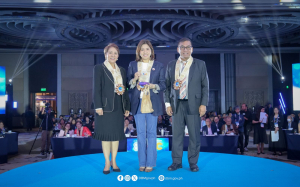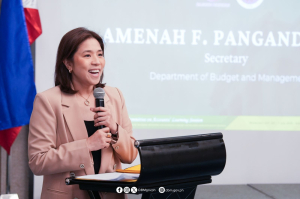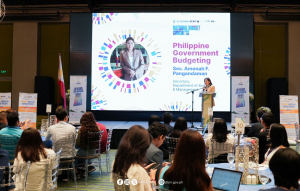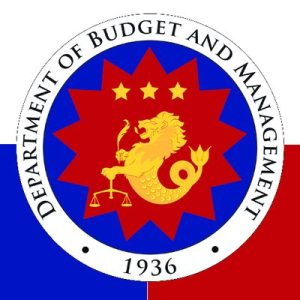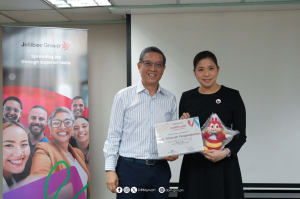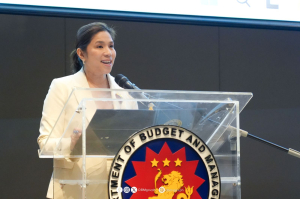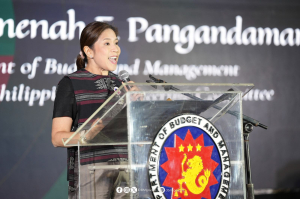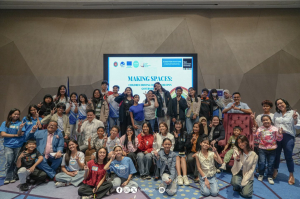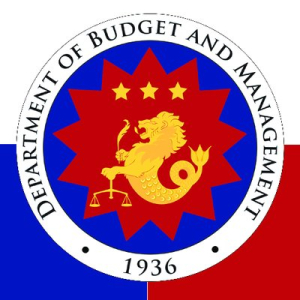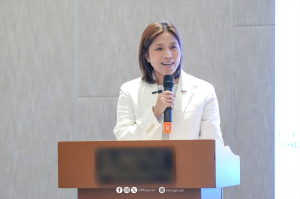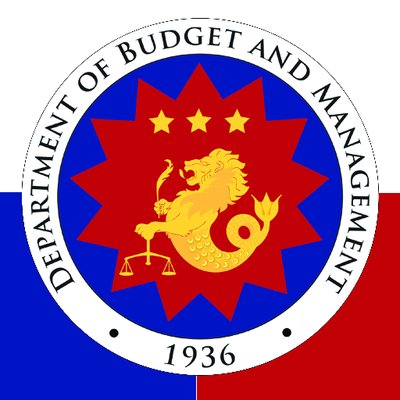
- Details
To my fellow public servants in the Department of Budget and Management—both from the Central and our Regional Offices—a pleasant day to all.
Let me begin by saying THANK YOU. Maraming salamat po sa inyong paglilingkod sa bayan at sa ating mga kapwa Pilipino. It is because of your invaluable contribution that the Budget Department has been able to exemplify reform-oriented public service. This is evident in the early submission and approval of the FY 2023 National Budget last December 16, 2022—historically the fastest signing of the General Appropriations Act.
I would also like to thank you for actively adopting our digitalization efforts in Public Financial Management or PFM. This initiative goes beyond reduction or lower operational costs. Through this, we are able to forward digital transformation in the bureaucracy and show that it is possible to integrate technology into our systems and processes—to ultimately promote transparency and enhance productivity.
We also have a lineup of significant reforms with the end-goal of ensuring the equitable, prudent, transparent, and accountable allocation and use of public funds to improve the quality of life of each and every Filipino.
First is the Progressive Budgeting for Better and Modernized Governance or the PBBM Governance Bill that will institutionalize the Cash Budgeting System or CBS. A shorter transitional arrangement is being proposed for FY 2023. To fully reap the benefits of the system and engender fiscal discipline and strategic planning among all government agencies, we hope to have the regional offices onboard.
We will also fast-track the development and implementation of the Budget and Treasury Management System or BTMS to improve convenience, efficiency, accuracy, and timeliness in fiscal management and reporting.
Last December 19, the Public Financial Management Committee composed of the DBM, the Department of Finance (DOF), the Commission on Audit (COA), and the Bureau of the Treasury (BTr) approved the adoption of the Integrated Financial Management Information Systems or IFMIS to enhance the BTMS.
At the local level, we are proposing an amendment to the EO on full devolution. That is why as early as now, I want to seek your help in monitoring and capacitating our local government units as LGUs transition and assume their devolved functions. As I’ve always said, our economic transformation agenda will not be truly inclusive without our local governments.
The bulk of this meeting’s agenda is aimed at capacitating our LGUs to better implement programs and interventions that are tailor-fit to the needs of their constituents. This includes the updated Budget Operations Manual for LGUs, the electronic Competency Assessment Tool for Local Budget Officers, and the Public Financial Management Assessment Tool for LGUs.
Sama-sama po nating isulong at ipatupad ang lahat ng ito. It is only when we discuss our ideas, align our national and regional goals, and synergize our efforts that we can implement these harmoniously.
Of course, we will continue to give our best in crafting a budget that serves all Filipinos, especially the vulnerable sectors. We will work closely with other government agencies and partners to ensure that we are prioritizing the pressing needs of our people. And at the end of the day, we will strive for accountability and transparency in our budget.
With the help of the Philippine Open Government Partnership, Freedom of Information, and Open Budget Survey, among others, we will increase public trust in the department and in government as a whole.
Muli, maraming salamat po sa inyong paglilingkod. Let us continue working together so we can move closer to our ultimate goal of ensuring that our Agenda for Prosperity will include every individual, family, and sector in the country.
Assalamu alaikum. Mabuhay tayong lahat.
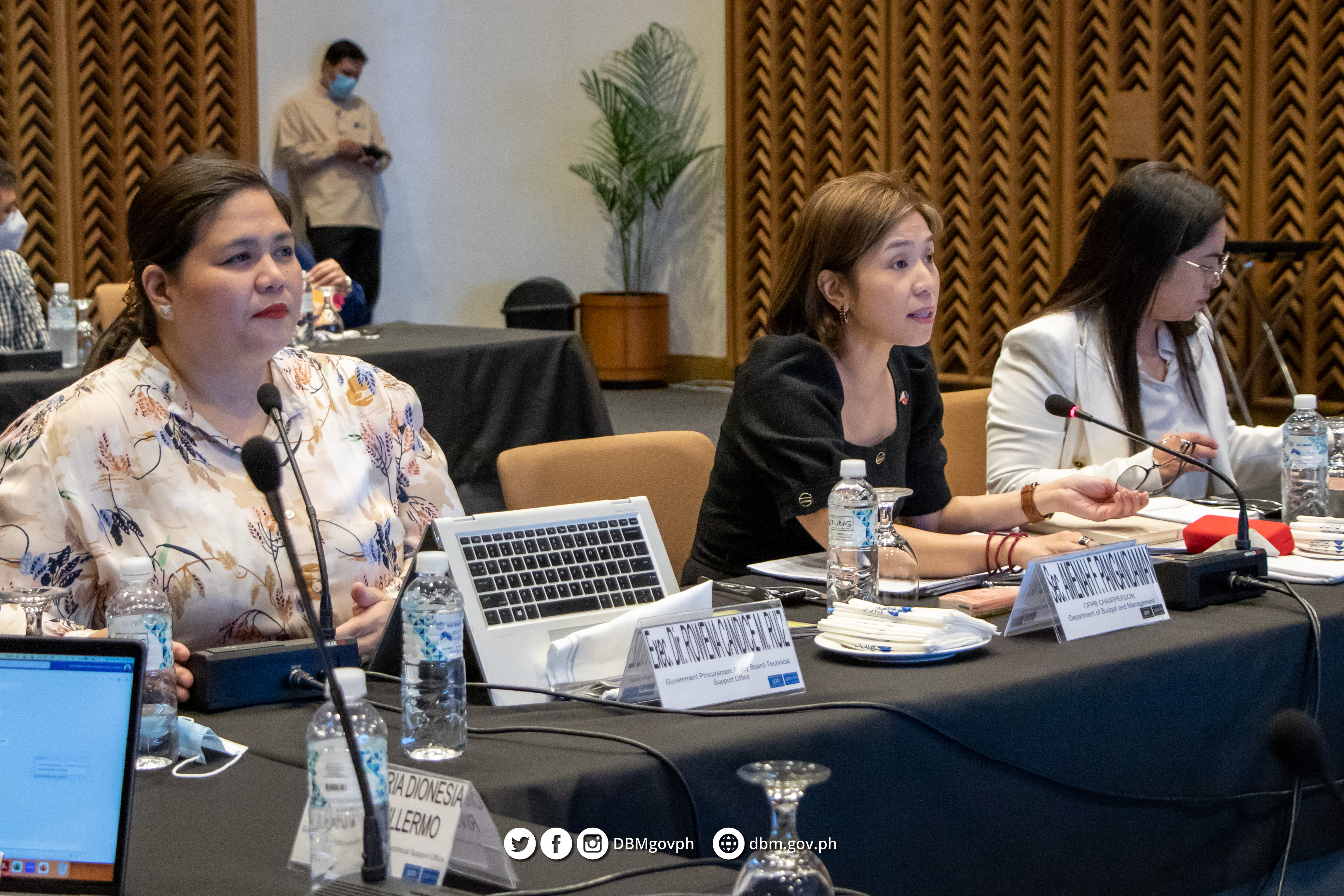
- Details

A pleasant afternoon once again to all the members of the Government Procurement Policy Board and every fellow public servant who is here with us for this year-end meeting.
I would like to thank all of you for supporting reform-oriented and people-centric initiatives that benefit the whole government and of course, our countrymen. I would like to commend the leadership of Executive Director Atty. Rowena Ruiz for encouraging everyone to carry out the Philippine government’s public procurement reform agenda.
I know that having to gather, engage with people who can help us, and re-orient ourselves to new ways of doing the things we have been doing for decades is a challenge in itself. Nevertheless, you willingly worked in unity, with us, and the other members of the Inter-agency Technical Working Group so we could set the foundations for up-to-date, technology-driven, and efficient public procurement policies, rules, and regulations.
We can also look forward to fruitful years ahead as we spearhead the implementation of the Green Public Procurement Roadmap which will integrate green choices in public procurement and put us closer to our ultimate goal of ensuring sustainable management and use of natural resources by 2030. As you all know, this is an advocacy that is really close to my heart.
That is why I am so grateful to all of you for strengthening collaborations and expanding networks that will result in multi-faceted solutions and innovations—all as we tread the path towards economic transformation. Coupled with our initiatives to digitalize government processes, records, and databases, this would hopefully help us realize our shared aspiration to take the Philippine procurement regime to the next level. And let us continue to educate our public procurement practitioners—the new ones and old ones alike.
Thus, we still have a lot of work to do to regain the trust of the public and meet international standards of procurement. But I truly believe that with sincerity in service, a focused determination to improve, and with the proper use of technology and digitalization for efficiency and transparency, we can transform procurement policies and processes to be a mechanism that will thrust forward and truly help us achieve our Agenda for Prosperity.
Maraming salamat po. Assalamu alaikum, and may this holiday season bring hope, joy, and prosperity to you and your families. Mabuhay po tayong lahat!

- Details
My warmest greetings to the participants of the Layag Pilipinas National Youth Summit!
First, I would like to thank the Pinag-isang Lakas ng Samahan ng mga Progresibong Atenista or PIGLASAPAT and the University Community Engagement and Advocacy Council of the Ateneo de Davao University, organizers of the 2022 Layag Pilipinas National Youth Summit, for having me as your keynote speaker.
I am delighted to know that young Mindanaoans are taking the lead in proactively pursuing change and development in our beloved land. This gathering is solid proof as it provides an avenue for youth leaders to convene on the topics of good governance, agriculture, gender and development, corporate and public sector, and youth empowerment. Please know that I stand with all of you as you advocate and pursue change in Mindanao.
When I heard the title of your event, Layag Pilipinas, the first thing that came to mind was the Balangay boats of our forefathers, the biggest of which was unearthed in Butuan City in Agusan del Norte. The Balangay was the first wooden watercraft excavated in Southeast Asia and is evidence of the courage, ingenuity, and craftsmanship of early Filipinos during pre-colonial times.
With this, please allow me to share with you some insights.
First, the discovery of the Balangay underscores how Butuan, and Mindanao in general, was a major center for cultural, religious, and commercial relations in Southeast Asia. As such, though we live in a very different time, I very much hope that you take a significant part in continuing the Mindanaoan legacy of making waves in the national and international scene.
Second, may this reference also serve as a reminder to never forget our roots while taking heed of current issues of the country. Learn to value the lessons of the past as we tread the present and prepare for the future.
Third, just like our ancestors, I trust that you will be courageous enough to discover what lies ahead of you, and more importantly, what the future holds for the country regardless of the sea of uncertainty that you have to sail through.
Finally, I firmly believe that today’s youth have the power to change the course of history and the fate of our people, much like how the early Mindanaoans rewrote Philippine maritime history. As cliché as it sounds, I hope you embody the famous saying of our National Hero Dr. Jose Rizal, “Ang kabataan ang pag-asa ng bayan!” This is such a big responsibility to carry but that is because you play a vital role in nation building.
Taking these points to heart—make good use of your talents and skills; engage with your co-participants; bring fresh ideas to the table; learn, relearn, and share lessons; participate in discourse and let your voices be heard; be at the forefront of advocating for good governance; and ultimately, be brave changemakers.
Rest assured that on our end in the government, we are committed to investing and empowering the youth, and ensuring that you are included in our Agenda for Prosperity.
Congratulations to you, the Mindanaoan Youth, as you make waves of change for the nation. Assalamu alaikum!

- Details

Philippine National Police Academy (PNPA) Deputy Director Police Brigadier General Joaquin Alva, to the PNPA Senior Officials, and to the 1,200 cadets and PNPA employees and public servants present in today’s flag raising ceremony, magandang umaga po.
It is my honor and privilege to speak before the primary institution responsible for training the future leaders of the Philippine National Police (PNP), the Bureau of Fire Protection (BFP), and the Bureau of Jail Management and Penology (BJMP). You are the uniformed personnel who serve as our vanguards of peace and order, our vanguards of safety and security.
On behalf of the Filipino people, we thank you for your commitment and dedication to your respective mandates. Saludo po kami sa inyong lahat.
We, at the Department of Budget and Management, fully support PNPA’s mission to provide the best comprehensive education, training, and leadership development program to transform you, our dear Cadets, into God-centered, competent, and trustworthy public safety leaders.
Indeed, leadership ranks high in the PNPA Curriculum, and I agree with General Noble that it is an essential virtue that cannot be just taught, but should be caught. It is not just learned; it is developed.
Nevertheless, I will try my best to impart my humble experiences and lessons in leadership from my experiences in government service, especially at the DBM.
Throughout my almost twenty years as a public servant, I learned from my mentors, especially the late Senator Edgardo Angara, that we must always strive for reform-oriented public service, and restore the public's trust in the government. We have to let the people know that the government is working for them and not against them. And we can do this by ensuring transparency and accountability through our key reforms and initiatives.
An advocacy close to my heart that is an initiative towards transparency and public participation is the Philippine Open Government Partnership or PH-OGP. This provides an avenue for genuine citizen participation in government processes and a platform for collaboration between champions and movers in government alongside our active non-government actors.
Just last Friday, the PH-OGP Steering Committee chaired by yours truly met in Davao City to discuss the institutionalization of the PH-OGP through a draft Executive Order. We are also in the process of crafting the 6th National Action Plan which will amplify collaboration between government agencies and the non-government sector in the design, implementation, and monitoring of our programs.
I hope we can have more reforms and initiatives to establish public trust such as this, and intensify information dissemination and provide more opportunities for exchange with the public. This way, the government’s presence will be more felt by the very people it pledged to serve.
Our pursuit of reform-oriented service towards public trust is also evident in our 2023 Proposed National Budget which was crafted to ensure that no one will be left behind—from our public servants including our uniformed personnel, to the public that we are sworn to protect. We are investing heavily in human capital development to provide every Filipino a fighting chance to manage life’s uncertainties and achieve their full potential.
Towards uplifting the individual capacities of our people, including government employees and our uniformed personnel, we likewise fully support the thrust of PNPA’s Cadetship Program in consonance with the thrust of the PNP, BFP, and BJMP, to develop professional, morally upright, and dedicated public safety officers imbued with the values of justice, integrity, and service.
In fact, our 2023 Proposed National Budget has given some Php 191.85 billion to the PNP; Php 27.79 billion for the BFP; and Php 22.34 billion will be for the BJMP. And this is just some of the many aspects of our budget and reforms that aim to capacitate and empower our people, and equip them to provide the quality of public service that every Filipino deserves.
Rest assured that the DBM is one with PNPA in the realization of its vision to be a world-class center of excellence in public safety education, producing professional and service-oriented public safety leaders who can go above and beyond the call of duty. Let us always be champions of good governance and public trust, so that the people’s confidence in the bureaucracy may never waver.
Assalamu alaikum. Maraming salamat at mabuhay ang mga magigiting na tanod ng ating kaligtasan!

- Details

Good afternoon once again to all the advocates of good governance present here today. Thank you for joining us in this fourth quarter Philippine Open Government Partnership or PH-OGP Steering Committee Meeting. As we adjourn this gathering, I aim to remind us of our reasons for pursuing an open government.
The PH-OGP’s commitment to transparency, accountability, citizen engagement or public participation, and digital governance are all grounded in the overarching objective to increase public trust in the government.
We want public trust that is neither solicited nor imposed but earned through quality public service, and transparent and accountable governance.
So, how do we achieve that kind of public trust?
We could achieve this kind of public trust by integrating the power of technology in our governance. Moreover, we must introduce reforms and programs and see them through as it is only through constructive and open dialogue that we can improve together and achieve our common goal.
Lastly, we should do all these with public participation in mind. In our digitalization efforts, we should work on information dissemination and provide opportunities for exchange with the public. Of course, we want our published content—our National Action Plans included—to be understood by the people so that they know what their government is doing.
We want our every allocation, decision, and implementation to be scrutinized and even challenged by them so they know that they are involved in our decision-making.
Doing and listening—these are the two elements that create trust in a relationship. As public servants who bridge the government and the people, may we do these with willingness and excellence.
Let’s begin doing these as we work towards the institutionalization of the PH-OGP through the draft Executive Order that we have discussed today. More than setting the direction, programs, and activities of the PH-OGP, and providing oversight to the Secretariat, may the PH-OGP Steering Committee always be reminded of who we are doing these for: the Filipino people we are sworn to serve.
Assalamu alaikum. Magandang hapon po muli at mabuhay tayong lahat!
